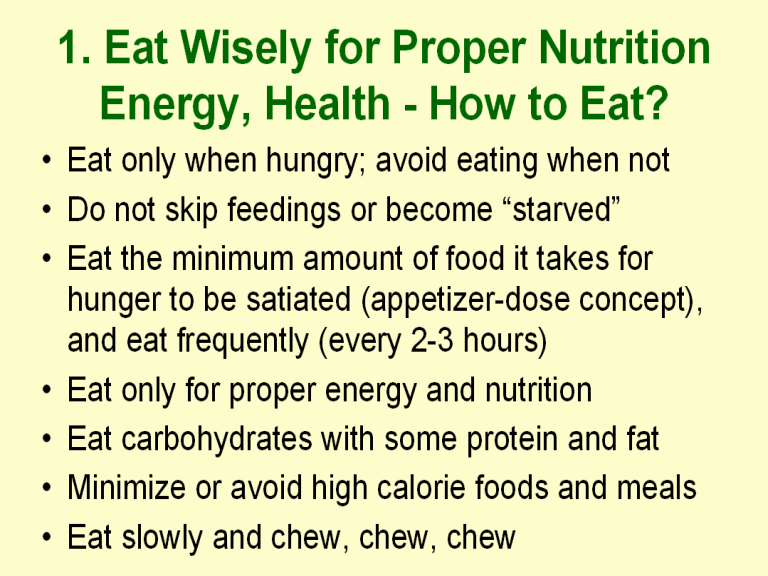Slide 8 of 15
Eating only when hungry, and avoid eating when not is straightforward yet complicated for most people because of all the reasons people eat. To avoid setting yourself up to overeat, do not skip feedings or become starved. Eat the minimum amount of food it takes for hunger to be satiated and eat frequently, say every 2-3 hours. The minimum amount of food to get satiated is what I call the appetizer dose concept. When you go into a restaurant and order an appetizer before your meal, you get your appetizer and your salad about 10 or 15 minutes before your meal. You eat that, and by the time the meal comes, you are no longer hungry. I have never had anybody tell me that they were. Never. This indicates that the size of an appetizer is the size of the feeding that takes away our hunger, and if we always ate this "dose", we would avoid eating too much food at any one time. But back to the restaurant scenario, who ever did not eat the meal when it came even though you weren't hungry? This leads to the next point.
We tend to eat for reasons other than being hungry or beyond when hunger has been satiated. Because we ordered it, we're there, it's noon. Sometimes the world requires us to eat on its schedule, not ours. Work, lunch hour, dinnertime, whatever. Try, if you can, to start feeding yourself when your body wants to eat. Find out what your "appetizer dose" is, and eat that. It is going to require, by the way, that you eat a little more frequently, but that is much more physiologic, and you won't store as much of that food, as well.
Eat only for proper energy and nutrition.
When you eat carbohydrates, even my favorite carbohydrate, which is fruit, it's best to eat some protein or fat at the same feeding. This is where nuts are great. The reason why is carbohydrates empty from the stomach very rapidly, which means that they get into your blood stream very rapidly, which means they raise your blood sugar very rapidly, which means that you stimulate a lot of insulin production, and then you clear the sugar from your blood very rapidly, and you get hypoglycemic and you get hungry rapidly. So, actually, eating carbohydrate alone can make you even hungrier and eat more. You can eat a whole bag of potato chips, but you can't eat a half a stick of butter because you'd throw up. Because there's a stop mechanism for fat. There's actually a stop mechanism for protein, which is mostly that it makes you not hungry by affecting the appetite center in your brain via stimulation by a hormone called CCK (cholecystokinin). But carbohydrate has no stop mechanism. The other thing that carbohydrate does is generate certain neurotransmitters in the brain, particularly tryptophan, the one that makes us tired. Eating carbohydrates alone generates a lot of tryptophan, whereas if you eat some protein with it, it generates a different neurotransmitter called tyrosine, which actually stimulates the brain rather than putting it to sleep.
Minimize or avoid high calorie foods.
"All you can eat buffet." Cheesecake a la mode. We know before we eat sometimes that this is going to be too much food or too many calories. See if you can bring your head into this eating game to avoid this problem.
Eat slowly.
Chew, chew, chew. Just like Mom used to say-30 to 40 times before you swallow. Chew until the food is liquid or entirely chewed. This is a very important part of digestion. It helps break the food down (the first phase of digestion) before it enters your stomach. So pulverize your food with your teeth. Another part of digestion in the mouth involves the enzymes in saliva which help digest starches and to a lesser extent, fat. But if you don't give your mouth a chance by keeping the food in there long enough to stimulate production of these enzymes and for them to have time to act on the food before being inactivated in the stomach, it's almost like you don't have saliva.
Next Slide
Back to FinerHealth.com Home Page













